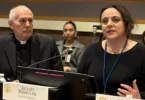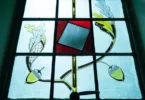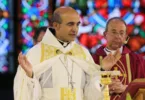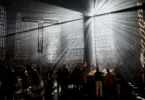
Victims’ pictures are displayed on a table in Sarajevo, Bosnia-Herzegovina, as people watch a TV broadcast of an international tribunal in the Netherlands March 24. Radovan Karadzic, a former Bosnian Serb leader, was convicted of genocide and nine other charges for orchestrating a campaign of terror that left 100,000 people dead during the 1992-95 war in Bosnia-Herzegovina. (CNS photo/CNS photo/Fehim Demir, EPA)
by Jonathan Luxmoore
OXFORD, England (CNS) — Church leaders in Bosnia-Herzegovina said a 40-year sentence against former Bosnian Serb leader Radovan Karadzic, convicted of genocide and nine other charges, will not secure peace.
“The imprisoning of one man won’t solve our problems,” said Msgr. Ivo Tomasevic, secretary-general and spokesman of the bishops’ conference. “The whole project he stood for — a war for territory involving ethnic cleansing — needs to be condemned and dismantled at its deepest sources.”
A U.N.-sponsored International Criminal Tribunal in the Netherlands sentenced Karadzic March 24. Karadzic was found guilty of orchestrating war crimes — including the July 1995 massacre of 8,000 Muslim men and boys at Srebrenica — during Bosnia’s 1992-95 civil war.
Msgr. Tomasevic told Catholic News Service March 28 that Catholics in Bosnia-Herzegovina were still suffering the consequences of “territorial occupation and ethnic cleansing” by Serb forces, adding that he and Bosnian Cardinal Vinko Puljic had been violently accosted when trying to visit parishes in Serb-controlled areas long after the 1995 Dayton Peace Accord, which brought an end to ethnic violence among Serbs, Muslims and Croats. However, since then, Bosnian bishops repeatedly have said the mostly Catholic Croat community is powerless and faces discrimination in a nation still divided along ethnic lines.
Msgr. Tomasevic said the church had sought “good ecumenical ties” with Serbian Orthodox and other religious communities, but found this difficult when past crimes were continually denied.
“It will be difficult to build peace without recognizing the war crimes committed and without acknowledging this was a war instigated in Belgrade by Serb forces,” he said.
“It’s also important that people should admit guilt for their own sins and seek redemption, distinguishing clearly between good and bad. Sadly, this doesn’t seem to be happening.”
Karadzic, who insisted on his innocence, is the most senior former Balkan leader to be convicted by the U.N. Tribunal, which so far sentenced 80 of 161 indicted figures and acquitted or dropped charges against 54.
Cardinal Puljic told the Croatian news agency HINA that The Hague tribunal had failed to condemn the ideology behind Karadzic’s crimes, adding that his jail sentence would be “insufficient without sincere repentance for the evil committed.”
“As long as there’s no repentance, it will be difficult to talk of any healing process. In dealing with past evil, it’s important to monitor everything and call everything by its real name,” he said.
Preaching March 27 at the Easter Mass in Sarajevo’s Sacred Heart Cathedral, Cardinal Puljic said the “power of faith” was needed to overcome suspicions and uncertainty “even today about who should be called to account for what.”
“Crimes cannot be settled with crimes, wounds healed with wounds, or lies corrected with lies,” said the cardinal, whose homily was carried on the Bosnian bishops’ conference website.
“Throughout history, we’ve seen how people commit evil and then wash their hands, claiming they’re not guilty — people disappear and are killed, but no one is to blame,” he said.
Karadzic’s lawyers said they would appeal his sentence, a process expected to take several years.






